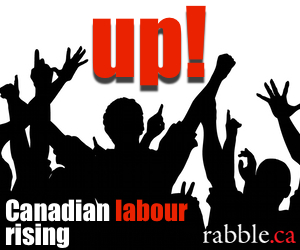I sometimes feel as if “the Left,” that massive catchall term for a group that’s meant to encompass everyone who isn’t a heartless, tax-hating, business-loving earth killer, is standing along the shore of the ocean. Together, we look outward trying to see the other side, but we are knocked down, again and again, by massive waves.
Whether we think we can withstand the waves or stop the waves simply by our presence doesn’t matter. We keep getting knocked down, standing back up and getting knocked down again.
All the energy it takes to get up again and again makes it impossible for us to see the boat that’s just to our left.
We must realize that there are solutions to the issues that face “the Left.” Indeed, many people already know this. But how do we organize, build consensus and energize the grassroots in order to build the campaigns and undertake the strategies that are necessary to win?
In my book, From Demonized to Organized, Building the New Union Movement, I point to the role neoliberalism has played in destroying our sense of community. I argue that for the labour movement to be able to fight back against right wing, anti-worker governments, it has to resist playing into divide-and-conquer politics and instead build communities.
To do this, labour unions need to be out front in all political campaigns. Unions need to be the organizations that coalesce, educate and organize communities. But, with diverse movements facing diverse obstacles, how are we to do this?
rabble.ca is launching a special labour series called UP! Canadian labour rising, during the CLC convention. UP! will create a space where we can examine these issues and feature the analyses of labour activists from various regions and sectors. It will reflect on these big questions.
The series starts with an article by rabble.ca president Duncan Cameron. UP! will feature an article a week, each one taking on a different issue. Each article will pose questions, offer insights and invite responses that build on other arguments.
The articles are not being posted in any particular order; no argument, region or sector should be seen as being more or less important than another. The series will be a mix of big-picture analyses and stories from the ground.
As the editor of UP! it is my hope that this series will stimulate constructive discussion, highlight strategies that are working, suggest alternatives where strategies have failed and invite responses from all unionists: rank and file workers and people in leadership roles.
If our movements are going to survive, we need to find new ways of organizing and recommit ourselves to working within our communities at the grassroots. By sharing our stories, perhaps we’ll collectively decide to stop standing in the water being battered by the waves, walk to shore and find our way into that boat to our left.
Check out the rest of the UP! Canadian labour rising series here.



